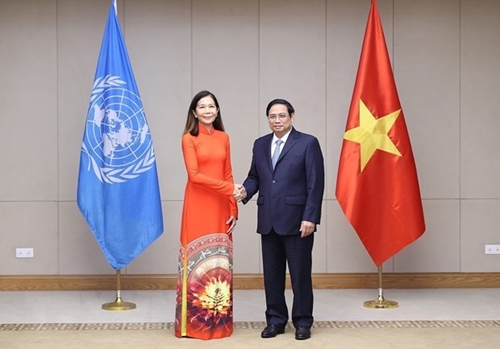The CF for the 2022-2026 period was signed by Minister of Planning and Investment Nguyen Chi Dung, as assigned by Prime Minister Pham Minh Chinh, and Tamesis in Hanoi on August 11.
According to Tamesis, there are four priority development outcomes that the two sides have identified - social services; economic transformation; climate change, resilience and sustainability; governance and access to justice.
    |
 |
|
Prime Minister Pham Minh Chinh receives U.N. Resident Coordinator in Vietnam Pauline Tamesis. |
The purpose of the cooperation framework is for the U.N. to be ready to support all of the changing development needs and challenges of Vietnam, she stressed.
The signing of the deal means the government of Vietnam and the U.N. are committed to strengthening their partnership together, she said, adding that this is just a starting point.
“We have the full period of this year to work together but it's urgent that we all take action in this partnership together because there's so many challenges around the world. And we need to be able to show results for the government to feel that the partnership is really delivering the results that it wants to see,” said Tamesis.
Regarding her priorities as new U.N. Coordinator, she said that one of her priorities is to make sure that the U.N. is able to support the Vietnamese Government in commitments to SDGs international standards, human rights, gender equality and women's empowerment.
She said that the most important thing for her is to be able to engage with the young people, hear their views and aspirations and hear the solutions that they want to see for development in their own country.
“It's not only the what, is also the how, innovation, for me, knowledge, foresight are key for us to navigate an uncertain world. So if we're we don't have that knowledge, we don't have that aspiration, to innovate, we will probably be overrun by many of these development challenges. So, rights, human rights, gender equality, youth and innovation,” she added.
Mentioning the expected outcomes of the CF in the future, Tamesis said that what she wants to see is a highly empowered community of stakeholders that are not only committed but have already delivered actions to ensure that no vulnerable group, no marginalized communities are left behind in the prosperity that Vietnam is is wanting to achieve.
Commenting on the commitment and efforts of the Vietnamese government in promoting sustainable development and improving the quality of life, the U.N. representative said that the first measure of governments' commitment is always in the policies that they enact. If the policies are people-centered and if the policies are really to protect and ensure that the most vulnerable are not left behind, this is already the sure sign of commitment.
The second is in how these policies are translated into investments in budget of the government to make these policies real and concrete.
"And then third is the engagement with the government in reaching out to the people in consultations, in partnering with many communities to be able to deliver development and I know this is happening, particularly very strongly at the provincial level. So we're very happy to know that our work is really progressing, because the government has already taken its leadership," she said.
Assessing Vietnam’s prospect in realizing sustainable development goals (SDGs), contributing to the happiness of the Vietnamese people in particular and those in the world in general, Tamesis held that Vietnam has a very strong track record in achieving the MDGs and it's also well poised to achieve many of the targets of the SDGs. However, there are many crises that are affecting not only Vietnam, but also the world. So a lot of the resources that would have gone to the Sustainable Development Goals are now a little bit channeled to the more urgent emergencies.
“The trick then is to make sure that these urgent emergencies the urgent crisis, and the response to this crisis, allows us to build the systems required for SDGs to be accelerated. And so this is where why I said the crisis is an opportunity to build better and transform the systems so that we can ensure that no one is left behind in the development of the country,” she stated.
Source: VNA